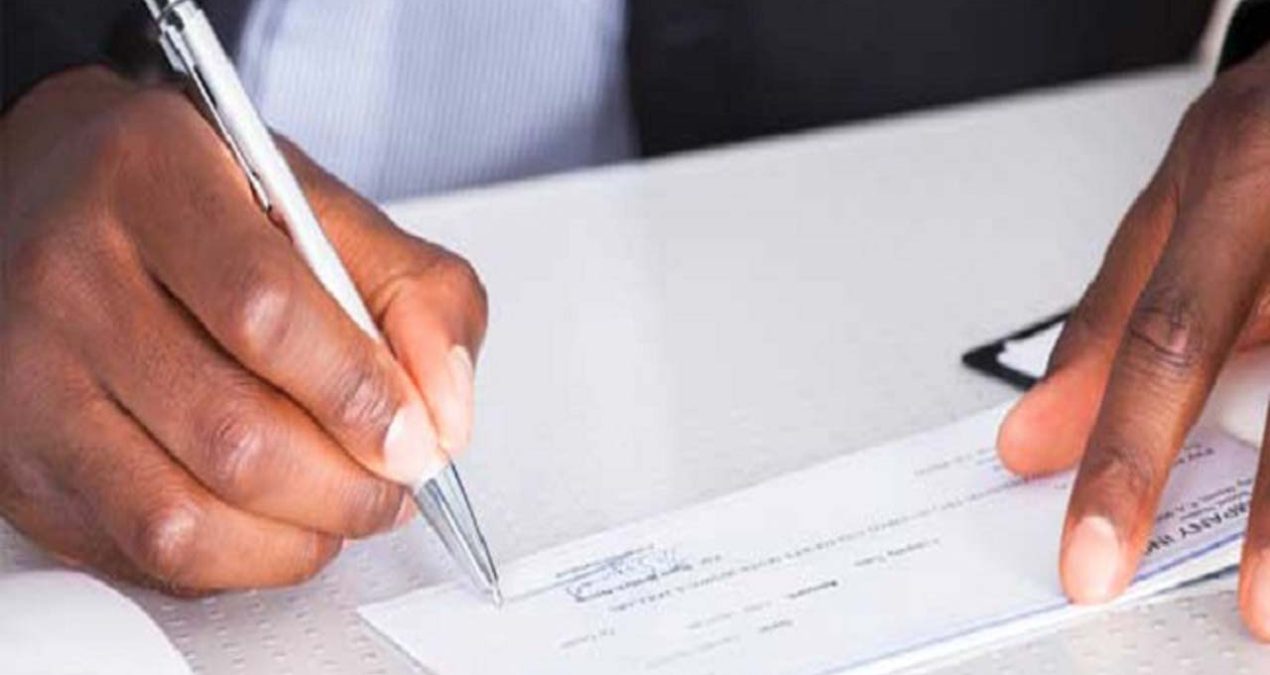“If we no get money, wetin we gain?”
-Victor AD
“If you no get money, hide your face!”
-Davido, Small Doctor
The quotes above are lines from the songs of popular Nigerian musicians that have repeatedly found their way to the top of the trending playlist. To delve into the truth or morality of these lyrics would be an incursion to the field of jurisprudence, which is outside the ambit of this article. One thing is clear from these lyrics however, money as well as bills of exchange is important in the smooth running of governmental and private lives.
Modern times have witnessed the ease of financial transactions such that with a mere signature or a few clicks, money can be transferred across various continents of the world seamlessly through the use of cheques, bank drafts, mobile applications or even USSD codes. The focus of this work would be on the use of cheques as a means of money transfer.
A cheque is “a written order to a bank to pay a certain sum of money from one’s bank account to oneself or to another person…. It metamorphoses into physical cash on due presentation at the bank and that makes it a legal tender. In other words, a cheque is always regarded as a legal tender or an instrument for payment once it is duly completed and signed with date[1]”.
What is a Dud Cheque?
For emphasis only, a dud or bounced cheque is one that cannot be paid because the person who wrote it has no money or not enough money in their bank account. At the risk of sounding repetitive, a “Dud” cheque is when you issue a cheque whose amount is more than the actual funds in your account.
Cheques are without doubt, a legal tender and a negotiable instrument. However, unless a cheque is honoured or cleared, it does not equate to money[2]. Where a customer has sufficient funds in his account, a bank has the duty to honour the cheque of the customer. Where a bank fails to honour the cheque of a customer that has sufficient funds in his/her account, such customer can:
- Sue the bank for breach of contract and the bank would be liable to pay damages[3]: This is rooted in the principle that the Bank is in law, deemed to be the agent[4] as well as the debtor[5] of its customer. As an agent and a debtor, a bank is therefore in a contractual relationship with the customer and a refusal to honour the cheque of the customer is a refusal to honour its contractual obligations.
- Sue the bank for defamation[6]: To defame a person is to lower that person in the esteem of right thinking members of the society. Generally, where defamation is oral, it is called slander but where it is written, it is libel. In this sense, where a bank dishonors the cheque of a customer, it may be presumed that such customer did not have sufficient funds in his account as he had claimed and therefore reduce his esteem in the eyes of the third party to whom the cheque was payable. Where a cheque which was payable to self, that is, to the customer, was dishonored, the Court has held that there was no defamation as his esteem was not reduced among the members of the society[7].
On the flip side, a bank may dishonour the cheque of a customer because such customer DOES NOT have sufficient funds in his account[8]. This cheque is often referred to as a dud cheque. This act of the customer has serious repercussions. In the case of N.B.N Ltd v. Opeola[9], the Court held that:
“A dud cheque paid into a bank is not only an embarrassment to the payer but also to the bank and therefore the banker. A banker which is not vigilant can get itself involved in serious accounting problems, at times, huge shortages, depending on the amount involved in the dud cheque.”
Perhaps, another reason why the issuance of a dud cheque is highly frowned at by the law is because the customer of a bank has the option of issuing a bank draft instead. Unlike a cheque, a customer does not need to have sufficient credit in his bank account to issue a bank draft. A bank is “payable at sight regardless of whether the person on whose behalf the draft was issued held money in his account at the material time or not”[10].
In any case, a customer who issues a dud cheque incurs both civil and criminal liabilities.

CRIMINAL LIABILITIES[11]
Is Issuing a Bounced Cheque a Crime in Nigeria?
The principal law that makes the issuance of dud cheque a crime in Nigeria is the Dishonoured Cheques (Offences) Act 1977. Section 1 of this Act proscribes a person from obtaining the delivery of anything capable of being stolen or obtaining credit for himself or any other person by means of a cheque that, when presented for payment not later than three months after the date of the cheque, is dishonored on the grounds of insufficient or no funds[12]. The punishment for this for an individual is two years imprisonment without the option of a fine[13]. If the offender is a corporate body, the punishment is a fine of not less than N5,000[14]. The Economic and Financial Crimes Commission (E.F.C.C) is empowered to prosecute cases of financial crime. As such, they are also empowered to prosecute instances of the issuance of dud cheques[15].
This Act further states that where the dud cheque was issued in settlement of an obligation under an enforceable contract entered into between the owner of the cheque and the person to whom the cheque is issued, the owner of the cheque is still liable to be punished irrespective of the fact that at the time the contract was entered into, the manner in which the obligation would be settled was not specified[16].
A defence to the issuance of a dud cheque under the Act is that the owner/issuer of the dud cheque had reasonable grounds for believing that the cheque would be honoured when presented for payment[17]. In line with the presumption of innocence accorded to an accused person under the Constitution[18], a person is not precluded from raising other probable defences to aid in his defence[19].

CIVIL LIABILITIES
Can I get Sued for Issuing a Dud or Bounced Cheque?
Aside from criminal liabilities, the issuer of a dud cheque also incurs civil liabilities for himself. The Bills of Exchange Act by Section 47(1) and (2) states to the effect that where a bill of exchange (which is inclusive of a cheque), is dishonoured, then an immediate right of action accrues against the drawer and endorser of that bill of exchange.
The reason for this provision is stated in Section 55 of the Bills of Exchange Act where the law says that such drawer or endorser of that cheque is liable because by so drawing or endorsing the cheque, he has made a representation that on the presentation of that cheque, the cheque would be accepted and the money would be paid by the bank[20]. This section further states that the drawer or endorser of a cheque has also impliedly guaranteed that if the cheque is dishonoured, he would compensate the holder of the cheque.
In considering the damages payable by the issuer of a dud cheque, Section 57 of the Bills of Exchange Act enjoins a consideration of the:
- The amount of the bill (i.e the amount of the cheque for the purposes of this article)
- Interest from the time of the presentation of the bill or maturity of the bill
- The expenses incurred in the noting or protest of the bill.
In recent times, to uphold the integrity of financial transactions, the Central Bank of Nigeria, through the Credit Registry launched an Application Programming Interface. The essence of this is to ensure that all financial institutions verifies the ‘dud cheque risk’ of their customers. Under this application programming interface, where the financial institution finds out that a person issues a dud cheque, that person may be:
- Banned from accessing credit facility for a period of five years
- All the unused cheque books of such a person would be cancelled.
Thank you for reading.
Written by Memma Udowoima BL
[1] Per Niki Tobi J.S.C in Bolanle Abeke v. The State (2007) 9 NWLR (pt. 1040) 411 at 432 paragraphs G-H; Section 73 of the Bills of Exchange Act
[2] PerAndrews Obaseki J.S.C in H.M.S Ltd v. First Bank (1991) 1 NWLR (pt. 167) 290 at 310 paragraphs E-F
[3] Nwosu v. Zenith Bank Plc (2015) 9 NWLR (pt. 1464) p. 336; Afri Bank (Nig.) Plc v. A.I Investment Ltd (2002) 7 NWLR (pt. 765) 40 at 64; U.B.A Ltd v. Ibhafidon (1994) 1 NWLR (318) page 123 C-D; Savannah Bank (Nig.) Ltd v. Salami (1996) 8 NWLR 9pt. 465) 131 at 140-141
[4] Yesufu v. A.C.B (1981) 1 SC 74 at 92; Union Bank v. Nwoye (1990) 2 NWLR (pt. 130) 67 at 77
[5] Akwule & ors v. The Queen (1963) All NLR 191 at 198; B.O.N v. Yau (2001) 10 NWLR (pt. 721) 408 at 438
[6] Balogun v. N.B.N (1978) 11 NSCC 135 at 143; Coker v. Standard Bank of Nigeria Limited (1976) NCLR 174 at 177-178; Ide Chemists Ltd. V. National Bank Nig Limited (1976) NCLR 143 at 148. In these cases, the Court also held that where it is also defamatory where a bank endorses a cheque as “referred to drawer” or “re-present cheque” or “return to acceptor”.
[7] I.B.W.A v. Kennedy Trans. (Nig.) Ltd (1993) 7 NWLR (pt. 304) 238 at 254; Kinlan v. Ulster Bank (1928) 1 IR 171
[8] Lack of funds or insufficient funds are not the only reasons why a bank may decide to dishonor the cheque of a customer. However, refusal based on lack of funds or insufficient funds is the focus of this article.
[9] (1994) 1 NWLR 141 paragraph C
[10] Section 83 of the Bills of Exchange Act; U.B.A v. Ibhafidon supra; Lagricom Co. Ltd v. U.B.N Ltd (1996) 4 NWLR (pt. 441) 185 at 205. However, when a customer presents a cheque and money or credit is given to the customer but the bank later finds out that such customer did not have sufficient money in his account, the cheque would be deemed to be a request for an overdraft, a loan. A.C.B v. Egbunike (1988) 4 NWLR (pt. 88) 350 at 365; A.C.B v. Babayemi (1969) NCLR 363 at 370; Barclays Bank of Nigeria v. Mahmud (1976) 1 FNR 26 at 29; B.O.N v. Yau supra; Adereti & Anor v. Attorney General, Western Nigeria (1965) NSCC 193
[11] Bolanle Abeke v. State supra; Abraham v. State (2018) LPELR-44136 (CA); Fajemirokun v. Commercial Bank Nigeria Limited (2009) All FWLR 487; Suleiman v. F.R.N (2018) LPELR-46667 (CA)
[12] Section 1(1) of the Dishonoured Cheques (Offences) Act
[13] Section 1 (1)(b)(i) of the Dishonoured Cheques (Offences) Act
[14] Section 1(1)(b)(ii) of the Dishonoured Cheques (Offences) Act
[15] Danfulani v. E.F.C.C (2016) 1 NWLR (pt. 1493) 239 at 246; Section 1(2)(c); Section 6(b)(h)(m); Section 7(1)(a)l; Section 7(2)(f) of the Economic and Financial Crimes Commission Act
[16] Section 1(2)(b) of the Dishonoured Cheques (Offences) Act
[17] Section 1(3) of the Dishonoured Cheques (Offences) Act
[18] Section 35 and 36 of the 1999 Nigerian Constitution (as amended)
[19] Emenegor v. State (2010) All NWLR (pt. 511) 884 at 913; Akpabio v. State (1994) 7 NWLR (pt. 359) 671
[20] Section 55(1)(a); Section 55(2)(a) of the Bills of Exchange Act.



